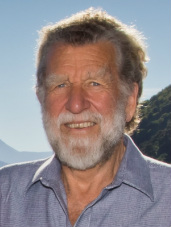|
Bill McKibben's article is essential reading. The vital statistics for a healthy earth are clear, disturbing to contemplate and essential to remember. We not only want to live a long time ourselves, but we want that opportunity to exist for generations to come.
0 Comments
I have come to two realisations.
The first is that Veganism is a way of life, it is not a diet. Diets come and go; they are seldom adhered to, are rarely effective in the long term and infrequently create happiness. Veganism is for ever, it works on good health, longevity and on establishing a good body weight. For all of the above reasons vegans avoid eating anything with animal protein or fat in it. If they are clever they will also sidestep processed foods including vegetable oils. It is happy a way of life. The second is one’s Veganism must be 100% in order to achieve good health and longevity. 80% vegan is easy, but ineffective. 100% Veganism does not guarantee perfect health nor immortality, but the 100% vegan is fully confident that everything is being done to achieve death from old age. I don’t imagine one can successfully be a partial Christian, Muslim, Teetotaller, Non-smoker or any other selected way of life and the same is true of Veganism. I would suggest that of all choices of ways of life, Veganism will guarantee you the greatest tenancy to a cheerfully long life. Click here to read a "remarkably cogent, lucid, eloquent, persuasive and magisterial piece" on Social Responsibility of Physicians by Dr. Bernard Lown. A wonderful essay to contemplate whilst taking control of our own health.
An article in the Dominion Post about Bruce Wills, Federated Farmers president on July 7, raised my ire and elicited the following letter to the editor. I subsequently discovered that it was too long, so precised it for the editor. I doubt that either version will be published, but felt my views should be aired somewhere, so here they are.
He states that forestry, farming and fishing account for more than 69% of export receipts for New Zealand and compares this with the 72% of mining and oil receipts of Australia, suggesting that New Zealand’s exports are more sustainable. I would suggest that his comparison is foolish. Forestry may appear to have some sort of sustainability, providing we don’t worry about the lack of biodiversity, nor the paltry receipts we earn from the huge amount of unprocessed wood going out as logs. Modern farming methods are without question unsustainable. The following facts have to be acknowledged. Phosphate fertilisers continuing to be mined elsewhere and brought in to the country, indicate an unsustainable practice. Nitrate fertilisers continue to inexorably pollute our otherwise pristine table waters, (even once all streams are fenced off), leading to an unsustainable situation. Relative to the volume of milk produced, water usage is extraordinarily high and unsustainable, (selling bottled water would use less and possibly be a higher net earner). Methane emissions from ruminants, a huge contributor to global warming, is an unsustainable practice and it will be a very long time, if ever, that this condition will change. The trucking of vast amounts of water laden bovine excretions (milk) around the country, only to have most of this evaporated away before the sale of a dry commodity is surely unsustainable. Fishing also suffers from an obvious lack of sustainability, in that there are now substantiated predictions that, even if the oceans don’t warm up to the levels being scientifically predicted, the world’s fish stocks will be depleted within 40 years. There is little New Zealand can do about this on the world scene. We must stop fooling ourselves. Not only are we still selling commodities, many of them unprocessed, to a faraway world market, we are selling against producers who are closer to market, on lower cost structures and often unrestricted by laws of behaviour. The growth of livestock numbers in developing countries is one of the worrying aspects of our future value as an exporter of animal protein. To cap all this is the proven and growing recognition that animal proteins and fats are the basic cause of all our major ailments, such as heart disease, cancer, vascular disease, Alzheimer’s, diabetes, obesity, arthritis and so many more debilitating and hideously costly diseases, the management of which are economically unsustainable. I suggest that our situation is no more secure than Australia, when they have “dug up all the ground”. I don’t know what our alternatives are but I sure do know that we should wake up to what our problems are. Parents who lovingly nurture their children safely through to adulthood in countless ways are always at risk of confusing their values.
When the protection of children from long term hazards are weighed against immediate risks, the immediate often takes precedence. If one was to compare the risk to life between using seat belts and eating dairy products, the risk of death in a car accident is very small compared to the near certainty of an agonizing debility in later life due to the foundations for cancers, vascular diseases and many other ailments being laid down in early life. The difference is the very occasional but immediate evidence of the former compared to the delayed response of the latter. Associated with the comparison is the huge marketing effort put into persuading parents that dairy products are essential for good health. Whereas there is ample proof that dairy products inevitably cause disease and premature death, there is an abundance of false information and a dearth of scientific data supporting the health giving benefits of milk. |
Loading
AuthorHaving joined the fast growing group of people who recognise the value of living on plant based whole food, I now want to share my experiences and views with as many others as possible. Archives
July 2014
Categories |

 RSS Feed
RSS Feed
